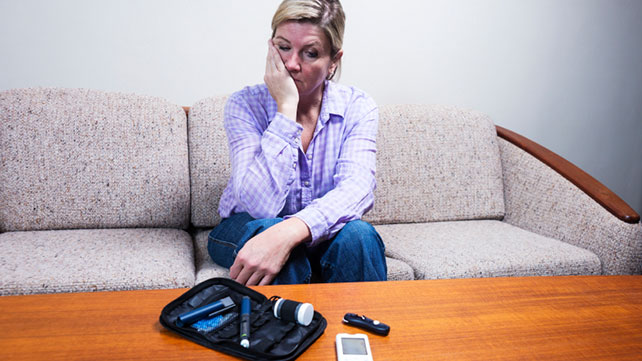Diabetes & emotional baggage – by CDE Jaleesa Whitford

As we come off the back of Queensland’s Mental Health Awareness week, I thought it best to continue on this stream of emotional wellbeing and give you a brief introduction into the understanding of the world of Diabetes, and just how much this condition can effect one’s psychological health.
Yes, Diabetes is very much a physical health condition; the body becomes resistant to the production of insulin OR insulin production is non-existent, leading to higher than normal Blood Glucose Levels (BGLs) and what seems like a lifetime of management. A typical person with T1DM performs in excess of 1,460 finger-pricks a year, with the number of insulin injections equally that, not to mention the numerous hypo episodes that can accompany this on a weekly basis. But psychologically, that above mentioned person with T1DM makes over 100 diabetes-related decisions every day, constantly feels tired from thinking about their diabetes and is troubled by the thoughts that their family is continually worried about them. Similarly, a person with T2DM, struggles daily with making changes to their life-long learnt behaviours, has to make frustrating decisions at meal times, resisting favourite foods as they juggle the confusion of what is now considered a healthy diet, unwillingly listening to stories within their social groups about people suffering from Diabetes-related complications, whilst desperately coming to terms with what the future may hold for them.
Diabetes, in its in many ways, shapes and forms, is not merely a chronic physical health condition. It requires the involvement of physical, behavioural and psychosocial health aspects that are all guided by one’s self control, self-respect and empowerment. In many cases it is the interlacing of these elements that can bring about the psychological baggage of Diabetes and make this physical health condition somewhat relentless to manage day in and day out.
So, what I would like to focus on is recognising the importance of Diabetes as a holistic health condition. In order for the physical management to be effective, we must learn to understand the psychological facets that are part of this condition, and then facilitate the most appropriate, individualised management plan for each individual to achieve their optimal holistic health outcomes.
What do we know about psychology and Diabetes?
The statistics indicate that an individual with Diabetes is more likely to develop distress, depression or anxiety symptoms, than that of an individual without Diabetes. WHY? Well the answer to that is mentioned above. When Diabetes enters our lives, it doesn’t just come with learning the skill of BGL monitoring and thinking twice about the types of food items one chooses to put in their mouth, but more-so the way an individual functions in its entirety. The burden that Diabetes self-management places on an individual is obstinate. Whether these burdens be the frequent, excessive worrying about ‘what ifs’ (anxiety, diabetes-specific fears), the physical and emotional exhaustion and ongoing distress (diabetes distress and burnout), or the persistent state of lowered mood, (depression) when despite doing everything that has been advised, management remains inconsistent and disappointing.
What most people with Diabetes don’t understand is that these changes to mental status and overall functioning also create havoc to the physical management of Diabetes.
When the stress response, also known as the ‘fight or flight response’ is activated within the human body, hormones (adrenaline and glucagon) are released by the pancreas and adrenal glands to assist the body in coping with this stress. As part of this adrenaline response, comes a release of glycogen (stored glucose from our liver) resulting in increased Blood Glucose Levels (BGLs); hyperglycaemia. This can therefore lead to difficult to manage BGLs, but also difficulty thinking, irritability, mood swings, sweating and heart palpitations.
Should this struggle to maintain stable mental health occur over an extended period of time, we may also see increased thirst (polydipsia) and frequent urinating (polyuria), most commonly overnight and expect poorer glycaemic outcomes and an increased risk of diabetes complications for these individuals. This can then lead to further disappointment, as BGLs are not stabilising as planned and overtime this becomes a vicious cycle, resulting in sub-optimal quality of life and increased risk of distress, anxiety and depression, on top of their Diabetes.
I guess what people with Diabetes should firstly be made aware of is that psychological health conditions are common in people with Diabetes. No, I am not saying that every person with Diabetes will have been or is affected by the psychological impacts of Diabetes, but simply that the risk is increased and that you are not alone. Recognising this fact should help alleviate the stigma associated with mental illness, and hopefully allow people the empowerment they need to seek help and advice.
Signs that you may be experiencing diabetes distress, diabetes burnout, anxiety, or depression could be;
- Continued worrying about what will if….
- Persistent (6 weeks) feeling of low mood and inability to find pleasure an happiness in activities that would otherwise bring about these emotions
- Physical and emotional exhaustion around the topic of Diabetes
- Heightened fears associated with Diabetes (hypoglycaemia/hyperglycaemia/injections/insulin/complications)
- Ongoing extreme and frequent discomfort and anxiety that disrupts general daily functioning
- No improvement in BG stability despite having made lifestyle changes, taken the advice from your healthcare team, and doing your best overall
Not all people with a period of impaired psychological state will require specialised services and support. We all have periods in our lives when we are feeling less than we usually would, fatigued and fed-up, and our day-to-day coping mechanisms are tested. It is important that we acknowledge these times and treat ourselves appropriately. Take time out to breathe and relax. Trying strategies like; having herbal teas, listening to calm music, reading, taking a walk or performing yoga, can be beneficial in improving mental state and sleep patterns.
Understanding how and when to implement appropriate management strategies is the key. Should these feelings not resolve with simple strategies in due time, it is vital to engage with your healthcare team. Management plans can then be tailored to the needs of each individual, ensuring that that they feel supported and that there is a light at the end of the tunnel. Keeping in mind that BGLs are generally hyperglycaemic (higher than target) at these times, so increased education, review and support from their diabetes team may be necessary to regain confidence, better stabilise BGLs and keep them safe during this time.
Tips for health professionals and people living with diabetes;
- Communication is the key with your health care team: find some one that you can build rapport and trust with, feel comfortable around and have confidence in. It is this trust that will create a supportive environment for collaborative decision-making skills, individualised plans with realistic goals and expectations, and increased satisfaction for both parties.
- Accept and acknowledge the intensity of challenges: whether you have been living with Diabetes for 35 years or have were diagnosed last week, you must be kind at incorporating Diabetes into your daily life. Expecting to change life-long behaviours and maintain these new behaviours in short periods of time can be unrealistic. Start slow and increase gradually over time. There is no such thing as perfect but in time we can begin to better understand what happens within our bodies and take more control with our management.
- Be honest: the risk of an individual with Diabetes also developing distress, depression and anxiety symptoms is higher than those who do not have the condition. We can only try to minimise the psychological stress associated with chronic health conditions but we cannot treat an issue and improve the quality of life for an individual, if we do not know it is there. It is OK to not be OK. Speak up if something doesn’t feel right so that the right services and support can be provided.
- Only you can be the change that you want to see. If referrals for specialised services and support can be offered, give these a try!
Self Support Options
If this has spurred any thoughts of concern with you and you find this relates to you, please speak with your health care team. Please also find below a list of support services that can be accessed in your own time.
- Beyond Blue: Nation-wide specialist support in depression and anxiety
- Phone: 1300 224 636 (24 hours helpline)
- URL: beyondblue.org.au (online chat: 3pm-12am AEST, 7 days/week)
- URL: beyondblue.org.au/resources (Diabetes, anxiety and depression factsheet)
- URL: beyondblue.org.au/resources (Have a conversation with your health professional preparation factsheet)
- Lifeline: Telephone and online crisis support and personal crisis service
- Phone: 13 11 14 (24 hours helpline)
- URL: lifeline.org.au (online crisis support chat: 7pm-4am AEST/AEDT, 7 days/week)
- Diabetes Australia
- Phone: 1300 136 588 (Mon-Fri 9am-5pm)
- URL: diabetesaustralia.com.au
- Peer Support for Diabetes (NDSS)
- URL: ndss.com.au (*download Peer Support PDF leaflet)
- Reading Resources or books:
- Put the brakes on diabetes burnout (from diabetescounselling.com.au)
- Diabetes burnout: what to do when you cant take it anymore (from bahvioraldiabetesinsititute.org)
